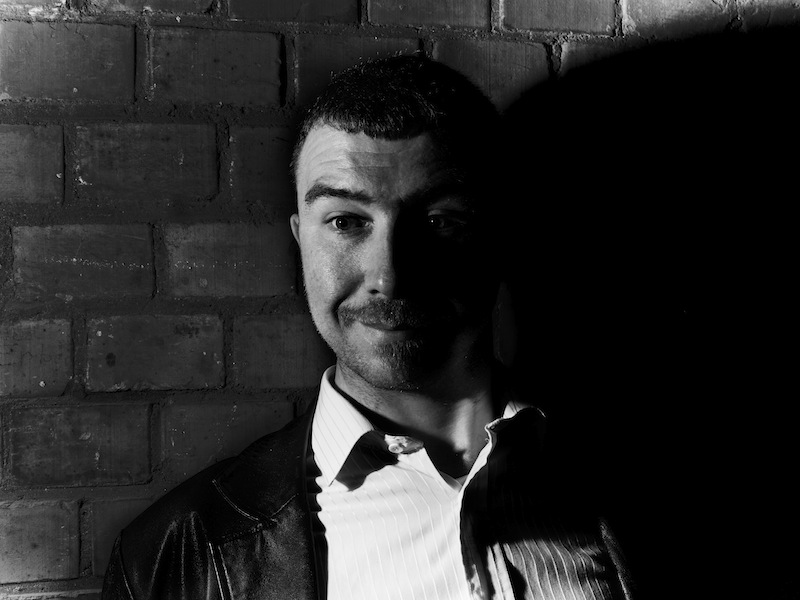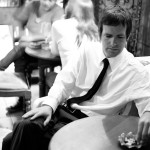[Photos by Lars Borges]
Words by Gamall Awad
With a brand new mix (Fabric 55, a seamless collection of original material like previous entries from Omar S and Ricardo Villalobos) hitting stateside stores next week, and the first release (Man On a String Part I and II) from his new label Woe To the Septic Heart on select shelves now, self-titled caught up with Shackleton via E-mail for one of the elusive artist’s most extensive interviews yet…
“Could you imagine asking the same about European music? It does seem a bit daft, doesn’t it?”
self-titled: Are you familiar with the Japanese concept of wabi-sabi, the notion that “imperfection in art makes it perfect?†Your use of sampled sounds at random moments reminds me of this.
I am not familiar with this, but my wife tells me it is really difficult to translate and culturally specific. In my music nothing feels random to me. I think about how all the sounds impact each other. It is difficult to make music that sounds spontaneous and random whilst using a medium that requires such calculation and pre-meditation. I think that this is what you are driving at. I like things that sound raw and alive. It is a paradox because it actually is the opposite of the process of making it.
Would it be correct to say you don’t listen to much dubstep and contemporary electronic music? I know in the early days of Skull Disco you were inspired by DMZ crew and Kode9:
Yes and no. I do listen to some contemporary music, but I just prefer not to align myself with a scene. The problem is that when Appleblim and I were listening to Kode9 and Digital Mystiks, there was no real term like dubstep. Now it is a common genre tag, but it is understood to mean something very different to what gave birth to it. Generally I like music that has its own personality and doesn’t rely on a scene or a fixed set of conventions to give it validity. If I am being very loose with the definitions and have to pin people down as dubstep artists, I would say I really like Peverelist amongst others. I don’t suppose the mass of people who like dubstep these days consider it dubstep though. I don’t know though.
You’ve talked in the past about how the name for Skull Disco was inspired by a book you read on tribal activity in Cameroon. Could you name the book? And have you also listened to music from Cameroon specifically?
That’s a good question. It is something I must do. The book was called Is the Sky Clear For You, I think. Maybe the author was called Nigel Barley or something. I don’t have a great memory. It was a good read, but the thing that stuck in my mind was the bit about the party where the tribe would dig up their dead relatives and put them in view of the party. That is where I got the idea for Skull Disco. [Ed. Note: “Is The Sky Clear For You†is a chapter in the 1983 Nigel Barley book The Innocent Anthropologist: Notes from a Mud Hut]
It would seem African music is a huge influence on your drum programming. Could you elaborate in more detail what specific African
 artists/records have influenced you?
It would seem so but actually not as much as you might think, or not in the ways you might think. First of all, I can’t claim to be an expert on the music of a whole continent, nor would I want to pretend to be. I think there is a lot of diversity there. You probably ask this because I use a lot of congas in my records. This is simply a frequency thing for me. I like the richness of the sounds and the varied tones, and I am not keen on the harsher sounds like you might hear in snare drums. Now it could be that in my programming that you hear a lot of influence from Africa, but I would say that it is an assumption based on association. What I mean to say is that you hear congas and automatically think of African rhythms. Actually, I make the beats that feel right to me and that make me move. Now it could be that those beats coincide with certain African rhythms because if I feel they are right to make me move then someone else could feel that they are right for the same reasons, or it could be that subconsciously I have been influenced, but I am not sure because that would be subconscious so it would be impossible to say. Hope that makes sense.
Of the stuff you are possibly referring to, I like lots of stuff from Tony Allen to Polyrhythmic Orchestra to Kasai Allstars to Fatala and to Mulatu Asteke, but it seems a bit ridiculous to group all this stuff together as African music as there are so many variations. I mean, could you imagine asking the same about European music? It does seem a bit daft, doesn’t it? Actually the stuff I like the most is probably not what you were referring to at all. I like a lot of the Gnawa stuff from Morocco and especially Mahmoud Guinea. This is a big influence on me. Not in terms of the instrumentation or rhythms, but in terms of how the music is constructed and the way that phrases are repeated and evolve.
Have you ever tried to replicate specific beats through sampling or reprogramming?
No, and I don’t want to. I think it would be silly to talk about the music of a whole continent and assume that it could be dissected. As I say, I am just making the music that is in my head. I never use loops or something or try to copy something else. I program everything step by step. It is finished when it sounds right to me internally.
Can you also discuss your experience remixing the Kasai Allstars for Congotronics?
I just listened to the parts and made what I thought was the best response to them. I wasn’t thinking about it. It was just instinctive.
Did you ever see Steve Reich’s book and his notation of African rhythms? Speaking of notation, can you read music the traditional way? I wouldn’t think you do but wondering to how deep your interest and research into African rhythms goes technically. Notation is one way in.
I can’t read music. I can just about work out which notes to play on a keyboard from a basic sheet but that is all. I have never read Steve Reich’s book but I like his work a lot. It is a lot more advanced that anything I do though and not really what I am aspiring to do myself although there are some things he has done that have given me ideas. I am flattered that you are giving me such a high standing with regards to my percussive stuff but it is really all just what’s in my head. I like dancing and so I make the music that I would want to dance to. I wouldn’t want to claim a lineage that isn’t there.
You’re working again with your original collaborator MC Great Emancipator, a.k.a. Tenfold Vengeance, on an ambient/spoken word project called Septic Heart. What’s that like? Will it be beatless? Didn’t he leave originally to convert to Islam? How is that impacting the music you are now making together?
There are no hard and fast rules to what we will do. Some of it is beatless, some of it is spoken word, some of it more ambient, some of it Gregorian monk style chanting, some of it drones and some of it four-to-the-floor or bassline driven. I really enjoy working with him and so it is fun for us. I suppose the Islam thing does impact on his lyrics but we probably won’t be doing any Cat Stevens type stuff in the foreseeable future. Lyrically it probably falls between prophecies of doom and exclamations of wonder and happiness–sometimes both at the same time and all the range in between. I don’t want the lyrics or music to be throwaway and so it probably sounds a bit bleak to some, but at the same time we approach it with humor and it makes us laugh as well.
It’s very easy to hear the influence of Darbuka drum patterns in your music, yet you’ve managed to use that without falling into clichés. Is this something you were conscious of–using and redesigning patterns?
I am glad you think that I haven’t fallen into cliché but, as I say, I just make the music that is in my head. If I tried to copy someone else, perhaps it would be easier to fall into cliché. I don’t know. I can only go with my ear on these things. If I were to use a kick and snare pattern would that mean that I had to sound like U2 or something? The instrumentation doesn’t force you into cliché although I suppose it could make you more likely to.

I am not sure that anyone can own the sound of a particular instrument. It is what you do with it that is important. That said, I know that these things do not come without a certain significance or symbolism. I suppose that it comes down to a lot of factors, amongst them being how well-integrated it feels.
Tabla playing seems to be a key influence on your rhythm programming. Would you agree? Are there specific influences? Talvin Singh did a great sampling CD and was wondering if you’ve used it. Also is Zakir Hussain any influence on you?
Perhaps subconsciously, but I am not sure. Strangely enough, I am listening to an album by Ravi Shankar and Ali Akbar Khan as I write this but I am getting off the most on the tabla playing! It’s a guy called Kanall Dutta. I can’t say that I have actively sought to replicate this. Again, I just go with my ear on these things. I never use CDs like the one you mentioned. I am sure it is great but I prefer the idea of the individual ear selecting sounds from places that aren’t laid out for you. Yes, I have taken a particular well-recorded percussive sound on many an occasion but, for me, I prefer to build my own loops. The problem with these types of CDs is that because you know that these are well recorded and for a purpose you can kid yourself that they are suitable for your music when they aren’t. In my case it is better to find things unexpected and to make my own sample bank out of sounds that I have selected for myself or to make my own beats. These beats are a central component to what I am making and so I wouldn’t like to use someone else’s. This is only my experience though and I wouldn’t want to speak for anyone else.
“They are so good it is almost painful”
Is there a specific reason that your rhythms seem to draw on African, Arabic and Indian influences more than club sounds?
Well, I don’t think they do draw so much and I am sure that if you played my music to musicians from these areas they would either laugh and tell you that it was a load of rubbish or be generous and say, “Very nice, but what has that got to do with what we are doing?”
But, all right, I understand what you are saying. The thing is that whether or not people in clubs tend to dance to a four-to-the-floor kick drum with a snare on the two and the four, or whether they dance to a kick drum on the one with a snare on the three doesn’t concern me overly when it comes to my own music. I am trying to make the music that I like and don’t feel compelled to adhere to a certain club convention. I like percussive sounds that are multi-tonal and I like rhythms with fluidity and life. When I am in a club I want to dance and this is the stuff that makes me dance. I am trying to lose myself in the beats I guess, and I need a certain suppleness. When I hear a snare cutting the sound so sharply and with such regularity, it can soon bore me or even snap me out of my enjoyment of the rest of the music. I can find it jarring and intrusive I suppose. I can’t really explain it any better than this. I suppose it is a question of the rigidity of it as much as the frequency. Now I am not saying this a rule or something, as I do like hearing a snare from time to time especially when it has a degree of syncopation. This I can enjoy as well but I just don’t feel it so much in my own music. But, I am not going to say never though. It is just what sounds right to me when I am in the studio.
Your use of electronic sounds for me brings to mind both Richard H Kirk from Cabaret Voltaire and Chris Carter from Throbbing Gristle / Chris & Cosey. I was just listening to the reissued first C&C album and one track sounded almost exactly like you now. I know some of that era of music is a big influence on you–can you say what records?
Well this is nice to hear but neither have been big influences. I only have one Cabaret Voltaire album, although I do like it a lot and I used to have a Chris & Cosey album but can’t remember it so well now. I really liked some of the Throbbing Gristle stuff when I was younger though. Strangely, at that time I really liked Second Annual Report and Heathen Earth and not so much 20 Jazz Funk Greats. I listened to 20 Jazz Funk Greats recently though and enjoyed it. I find Throbbing Gristle much more humorous these days than I used to find them. I think I enjoyed being scared by it as much as anything as a youngster.
You’re from a small town in Lancashire. Was it industrial? Did this influence the music you listened to?
I am from the archetypal Northern Milltown as it goes, although my mum and stepdad moved to the suburb when I was 13. I am a time-served toolmaker and machine operator as well and so I have a pretty good idea about industrial graft I suppose. That said, I don’t really believe in the whole industrial music thing. I like interesting music and not music defined by genre. Rather than Chris and Cosey, whom I haven’t followed as well as I perhaps should have done, I like Coil a lot from the old TG line up. This is pretty much everything I want from music sometimes. The Musick To Play In the Dark albums are amongst my favorite records. I have difficulty listening to them sometimes because they are so good it is almost painful. I have Zeke, the artist who did the sleeves for Skull Disco and Woe To The Septic Heart, to thank for introducing these two to me.
I just heard [about Sleazy’s death]. I was listening to one of those albums in a pretty emotional state on the evening preceding the night he passed away. Actually I broke off writing this interview to listen more intently. Strange really. I know it is just a coincidence, of course, but it still pulled the heartstrings again when I realized. 

I think people in my hometown seemed to like the same as most other places in Britain. Queen and Meat Loaf seemed to be popular. I always remember stuff like Glen Campbell playing in the pubs as well. I am not sure that there was a particular soundtrack to the town. I don’t really like this kind of talk unless it is literally true to be honest.
You recently remixed Scientist. Can you discuss the influence of Jamaican dub on your music and approach to sound, especially the bass?
He remixed me actually. I don’t know what to say about this really. Respect where it is due. It is a massive honor. I haven’t really been an avid reggae listener for quite a few years to be honest but for sure that it has had some direct or indirect effect.
Talking specifically about bass though, I think there is a big influence of bass culture in parts of Britain due to the colonial past. It is a big influence on what is played in clubs I think and what people in the bigger cities are exposed to. Yes, of course it is important. By the same token, it is just another part of the frequency range and not exclusively a Jamaican thing. I think the whole frequency range has a place in music. I like hearing heavyweight baselines as much as the next person but I would get bored of that on its own so I don’t want to make a fetish out of it.
You’ve mentioned Can, Faust and Kraftwerk as being part of your early listening. Can you discuss the influence of specific records? Where you inspired by the Motorik beat and the use of repetition?
Well, I did use a Motorik beat for the Harmonia remix but that was me paying a deliberate tribute. I wouldn’t normally use one and I don’t think that you will find any others in my music. No, I am not really that inspired by the Motorik beat.
I like Can’s groove I suppose. There is something in tracks like “Halleluwah” that makes me want to move. It is also multi-dimensional music. There is a lot going on and plenty to stimulate and interest. I really like Tago Mago and Future Days as albums, but I like pretty much everything from the Mooney/Suzuki years. I like Faust 4 a lot and from Kraftwerk, I really like the side of Autobahn that doesn’t have “Autobahn” on it and also the whole Man Machine album the best, but there are loads more that I like as well.
Can you discuss the impact Zip and Villalobos have had on your sound? What have you learned from being exposed to them as people and musicians?
I doubt they would either. I have never really worked in any real way with Zip or Ricardo in a musician sense. I did a remix for Ricardo and he did one for me, but I didn’t see how he did it or vice versa, so I can’t pretend to have learned a lot there. I know Zip quite well and I like him. I think we are both quite similar minded with our idea of how to release music and how to market things, i.e. neither of us really bothers with it. I do not know Ricardo as well as people assume but I like him in any case. The thing is that both of them are total music lovers and do what they do because it turns them on. This is very reassuring to know.
Can you talk about how you put together the Fabric mix briefly–was it an attempt to replicate your live show?
Yes, something like that. I played at Fabric last summer and Judy [Griffith] really liked the performance and asked if she could put it online. I said I wasn’t so keen on that and so it ended up with me doing a studio mix for a Fabric CD. I thought it was right to do something that would be a representation of the set that I had played on the night. That said, I didn’t try to replicate it exactly. I wrote out a basic tracklisting sketch and went with a more spontaneous mix from there. It sounded a bit messy and some bits could have been better and so I went back into it and edited it.
Can you let us know the rough plan for your new label Woe to the Septic Heart? Where does the name come from?
I don’t really have a plan. When I make music I am happy with and think that I would like other people to hear it as well, then I will put it out. It will just be for my own productions though. The name is an amalgamation of things. Vengeance Tenfold first gave me the idea from a lyric of his. He has probably even forgotten it but he had the words “septic heart” in one of his lines and for me this was a really strong image. I was talking to Zeke about it and we both agreed that this really conjured up something in the imagination. I then put it to the back of my mind because, even though I liked the image, I thought that it needed mediating somehow as I don’t want to present something so negative to people or be seen as promoting negativity. It sounded too much like an angst-ridden heavy metal band or something. I am not really into the dark for the sake of its vibe. It is a bit tedious for me.
Anyway I was listening to Johnny Cash, reading the Bible, and really enjoying it. I especially liked this listing of people who get “Woe to” before their names. For example, “Woe to the Pharisees:” I thought “Woe to the Septic Heart” worked well because I really liked the image of a septic heart but actually wouldn’t want people to think I was promoting that. Rather the opposite. The more I thought about it, the more it sounded right. It is a bit ridiculous and a bit of a mouthful, but I really like it as a phrase and it is not as potentially alienating as Septic Heart on its own.
Vengeance Tenfold (commenting via E-mail): And credit must go to [my wife] young Katya here. She was the one who first articulated the fact, coming from a sublime Islamic perspective naturally, that it is precisely the septic heart–that is, the corruption of the æon and of the sublunary archons, neo-liberalism, and the materialist malaise in general–that must be opposed, or rather, avoided by turning to something higher. May Allah purify the hearts of his believers and grant them the highest station among the righteous. And then we came up with “Flee the Septic Heart,” “Against the Septic Heart,” “Septic Heart My Arse, Mate,” etc.
How would you describe your day to day listening habits? Personally I’d divide mine into three segments: research (listening to educate/learn about forms), enjoyment (listening to things I love), and staying up (listening to new music). How would you describe yours and could you mention some of the music that you’ve been listening to most recently?

I generally play music that I am in the mood for. As for what I have been listening to recently, considering the length and depth of your questions, why don’t I just tell you what I have listened to whilst writing this interview? It has been quite a lengthy one! The Ravi Shankar album I already mentioned; Coil, Musick To Play In the Dark Vol. 2; Czukay/Leibezeit/Wobble 12”; Technical Space Composer’s Crew Canaxis 5 (a wonderful present from a friend); Konono No.1, “Assume Crash Position.”
It’s a HORRENDOUS cliché to ask this but if you were to be imprisoned on a
 desert island what music would you take with you?
I don’t know. I recently read [the Alex Ross] book The Rest Is Noise, which I loved, but when I bought a load of the stuff, I couldn’t get along with some of it. Especially Stravinsky. Perhaps I would take this stuff, as I am sure there’s loads going on that I just haven’t been able to get my head around yet but time would reward.
Do you have any plans to come back to the US for live shows? I heard a rumor
 recently that you don’t want to travel here.
No, I don’t have any plans to come back anytime soon. I do like New York though.






